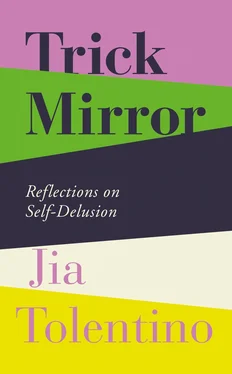Selfhood buckles under the weight of this commercial importance. In physical spaces, there’s a limited audience and time span for every performance. Online, your audience can hypothetically keep expanding forever, and the performance never has to end. (You can essentially be on a job interview in perpetuity.) In real life, the success or failure of each individual performance often plays out in the form of concrete, physical action—you get invited over for dinner, or you lose the friendship, or you get the job. Online, performance is mostly arrested in the nebulous realm of sentiment, through an unbroken stream of hearts and likes and eyeballs, aggregated in numbers attached to your name. Worst of all, there’s essentially no backstage on the internet; where the offline audience necessarily empties out and changes over, the online audience never has to leave. The version of you that posts memes and selfies for your pre-cal classmates might end up sparring with the Trump administration after a school shooting, as happened to the Parkland kids—some of whom became so famous that they will never be allowed to drop the veneer of performance again. The self that traded jokes with white supremacists on Twitter is the self that might get hired, and then fired, by The New York Times, as happened to Quinn Norton in 2018. (Or, in the case of Sarah Jeong, the self that made jokes about white people might get Gamergated after being hired at the Times a few months thereafter.) People who maintain a public internet profile are building a self that can be viewed simultaneously by their mom, their boss, their potential future bosses, their eleven-year-old nephew, their past and future sex partners, their relatives who loathe their politics, as well as anyone who cares to look for any possible reason. Identity, according to Goffman, is a series of claims and promises. On the internet, a highly functional person is one who can promise everything to an indefinitely increasing audience at all times.
Incidents like Gamergate are partly a response to these conditions of hyper-visibility. The rise of trolling, and its ethos of disrespect and anonymity, has been so forceful in part because the internet’s insistence on consistent, approval-worthy identity is so strong. In particular, the misogyny embedded in trolling reflects the way women—who, as John Berger wrote, have always been required to maintain an external awareness of their own identity—often navigate these online conditions so profitably. It’s the self-calibration that I learned as a girl, as a woman, that has helped me capitalize on “having” to be online. My only experience of the world has been one in which personal appeal is paramount and self-exposure is encouraged; this legitimately unfortunate paradigm, inhabited first by women and now generalized to the entire internet, is what trolls loathe and actively repudiate. They destabilize an internet built on transparency and likability. They pull us back toward the chaotic and the unknown.
Of course, there are many better ways of making the argument against hyper-visibility than trolling. As Werner Herzog told GQ , in 2011, speaking about psychoanalysis: “We have to have our dark corners and the unexplained. We will become uninhabitable in a way an apartment will become uninhabitable if you illuminate every single dark corner and under the table and wherever—you cannot live in a house like this anymore.”
The first time I was ever paid to publish anything, it was 2013, the end of the blog era. Trying to make a living as a writer with the internet as a standing precondition of my livelihood has given me some professional motivation to stay active on social media, making my work and personality and face and political leanings and dog photos into a continually updated record that anyone can see. In doing this, I have sometimes felt the same sort of unease that washed over me when I was a cheerleader and learned how to convincingly fake happiness at football games—the feeling of acting as if conditions are fun and normal and worthwhile in the hopes that they will just magically become so. To try to write online, more specifically, is to operate on a set of assumptions that are already dubious when limited to writers and even more questionable when turned into a categorical imperative for everyone on the internet: the assumption that speech has an impact, that it’s something like action; the assumption that it’s fine or helpful or even ideal to be constantly writing down what you think.
I have benefited, I mean, from the internet’s unhealthy focus on opinion. This focus is rooted in the way the internet generally minimizes the need for physical action: you don’t have to do much of anything but sit behind a screen to live an acceptable, possibly valorized, twenty-first-century life. The internet can feel like an astonishingly direct line to reality—click if you want something and it’ll show up at your door two hours later; a series of tweets goes viral after a tragedy and soon there’s a nationwide high school walkout—but it can also feel like a shunt diverting our energy away from action, leaving the real-world sphere to the people who already control it, keeping us busy figuring out the precisely correct way of explaining our lives. In the run-up to the 2016 election and increasingly so afterward, I started to feel that there was almost nothing I could do about ninety-five percent of the things I cared about other than form an opinion—and that the conditions that allowed me to live in mild everyday hysterics about an unlimited supply of terrible information were related to the conditions that were, at the same time, consolidating power, sucking wealth upward, far outside my grasp.
I don’t mean to be naïvely fatalistic, to act like nothing can be done about anything . People are making the world better through concrete footwork every day. (Not me—I’m too busy sitting in front of the internet!) But their time and labor, too, has been devalued and stolen by the voracious form of capitalism that drives the internet, and which the internet drives in turn. There is less time these days for anything other than economic survival. The internet has moved seamlessly into the interstices of this situation, redistributing our minimum free time into unsatisfying micro-installments, spread throughout the day. In the absence of time to physically and politically engage with our community the way many of us want to, the internet provides a cheap substitute: it gives us brief moments of pleasure and connection, tied up in the opportunity to constantly listen and speak. Under these circumstances, opinion stops being a first step toward something and starts seeming like an end in itself.
I started thinking about this when I was working as an editor at Jezebel, in 2014. I spent a lot of the day reading headlines on women’s websites, most of which had by then adopted a feminist slant. In this realm, speech was constantly framed as a sort of intensely satisfying action: you’d get headlines like “Miley Cyrus Spoke Out About Gender Fluidity on Snapchat and It Was Everything” or “Amy Schumer’s Speech About Body Confidence at the Women’s Magazine Awards Ceremony Will Have You in Tears.” Forming an opinion was also framed as a sort of action: blog posts offered people guidance on how to feel about online controversies or particular scenes on TV. Even identity itself seemed to take on these valences. Merely to exist as a feminist was to be doing some important work. These ideas have intensified and gotten more complicated in the Trump era, in which, on the one hand, people like me are busy expressing anguish online and mostly affecting nothing, and on the other, more actual and rapid change has come from the internet than ever before. In the turbulence that followed the Harvey Weinstein revelations, women’s speech swayed public opinion and led directly to change. People with power were forced to reckon with their ethics; harassers and abusers were pushed out of their jobs. But even in this narrative, the importance of action was subtly elided. People wrote about women “speaking out” with prayerful reverence, as if speech itself could bring women freedom—as if better policies and economic redistribution and true investment from men weren’t necessary, too.
Читать дальше












